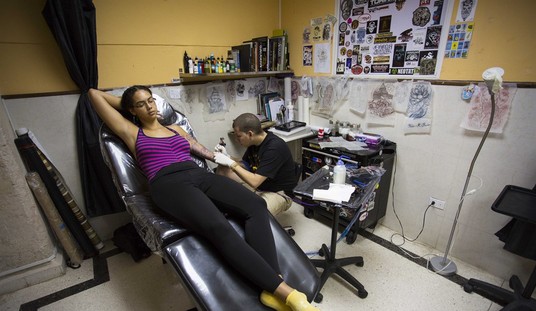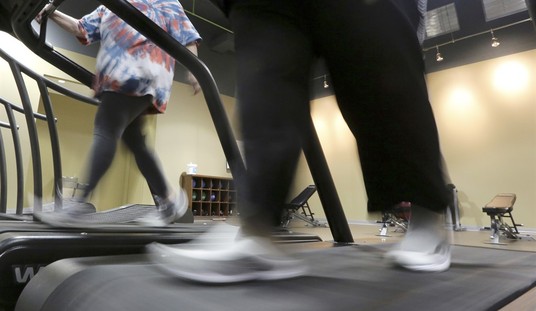We lived in an electric world. We relied on it for everything. And then the power went out. Everything stopped working. We weren’t prepared. Fear and confusion led to panic. The lucky ones made it out of the cities. The government collapsed. Militias took over, controlling the food supply and stockpiling weapons. We still don’t know why the power went out. But we’re hopeful someone will come and light the way.
This was the intro to NBC’s post-apocalyptic series Revolution, which painted a bleak picture of how the United States might fare in the event of a massive — fifteen years in the show — power outage. After I recovered from my initial shock at an America gone so wrong that in fifteen years no one could figure out how to generate electricity (Common Core math, anyone?), I began to wonder how long it would take our country to descend into the near-anarchy portrayed in the show — where people panic and the government collapses in the wake of a nationwide emergency.
In his new e-book, Surviving the End: A Practical Guide for Everyday Americans in the Age of Terror, James Jay Carafano says there are two crucial moments that determine whether someone will survive a disaster. The first is the “golden hour,” when a seriously injured individual needs to receive emergency medical care in order to survive. The next tipping point is the 72-hour mark. Individuals who can’t get water or are exposed to harsh weather for up to three days will likely die.
But what happens if the crisis is extended and ongoing and the government is unable to provide assistance in the wake of a catastrophic event?
In his book, Carafano, the Heritage Foundation’s leading expert on national security and foreign policy challenges, gives examples of events in the United States that took a tragic turn when a disaster struck, like during a major power outage in New York in 1927 when a cascading power failure produced a blackout. Despite the fact that the blackout only lasted for a day, Carafano says, “In a city already on the edge with sky-rocketing crime, racial tension, and civic unrest, the dark unleashed a night of terror and looting unseen in New York since rioting during the Civil War.”
Other communities Carafano studied handled crises significantly better, in part because members of the church or the community pitched in to help. Carafano notes:
There is a pretty broad consensus that faith-based organizations are among the top performers during a crisis. The tasks they perform, such as supplying food, clothing, and shelter to those in need, or providing mental health responses for everything from stress and grief counseling to recovery from spousal abuse, can be immensely valuable for communities struggling to survive in the wake of a catastrophe. Being connected to a faith-based organization could well be critical for staying alive when nature or men do their worst.
Carafano is spot on with this advice.
Our family attends a church with about 500 members, representing a wide range of ages, income levels, job skills, and life experiences. We have engineers, carpenters, welders, counselors, lawyers, nurses, business owners, auto mechanics, hairstylists, teachers, farmers, computer specialists, and homemakers. We also have a collection of wise, white-haired men, who slogged through the jungles of Vietnam or marched across Europe during the time they served in World War II. No matter what the crisis, I have no doubt our tightly knit church community would rise to the occasion, beginning on Day One with an enormous pool of skills and talents from which to draw. Moreover, the extensive experience and wisdom in the group could be combined and leveraged to provide leadership and innovative solutions to problems that arise in a doomsday scenario.
According to Carafano, decision-making during a crisis is crucial:
It helps to have a strong moral core to drive that decision-making. … Ethical decision-making helps individuals during stressful situations determine the right course. Further, the more collaboration there is among the right people at the right time focusing on the right issues with the right information, the better are the decisions that get made. That kind of trusting relationship makes it a lot easier to get the right things done.
Churches are well suited to the task of producing ethical leaders with a “strong moral core” in the wake of a disaster. In most churches, the individuals best prepared for leadership in a crisis (qualified in part by their good moral reputation) have already been identified and are likely already serving in the church in some capacity.
But Carafano warns,
Sadly, America is going the way of Europe. According to surveys, the number of Americans who identify themselves as having no religious affiliation has been growing rapidly. By some estimates, the percentage has doubled since 1990. The best advice—if you want to up your odds of surviving a disaster—is don’t become a part of that statistic.
Which brings me back to Revolution. Other than a token nod to a religious relic now and then or a discussion between characters about “something out there,” no reference was made to organized religion. It left me wondering how the writers envisioned it. Did the disappearance of the churches in Revolution’s America precede the Blackout and the collapse of the government or was it the other way around? Did the churches die after everything collapsed?
In the real world, churches tend to not only survive tragedy — and even persecution — they rise to the occasion and thrive. But if we go the way of Europe and continue down the road of becoming a post-Christian nation, our future looks terribly bleak in the event of a long-term catastrophic event in the United States. We could indeed expect to experience anarchy and the collapse of our government and our communities.
I highly recommend Carafano’s book. It’s packed full of great practical advice about disaster preparedness — how much water you should store, what to do in a wildfire, how to protect yourself from a dirty bomb. I realized even before I finished reading the introduction that our family is woefully unprepared for a disaster and we will use the book to create a plan so that we are not caught off guard in the event of an emergency.
But I think the best advice in the book is worth repeating: “Being connected to a faith-based organization could well be critical for staying alive when nature or men do their worst.”
If you’re not involved in a church, or if you’ve been away for a while, this is one more reason to reconsider that decision (Christians friends, the Bible commands us not to forsake the “assembling of ourselves together, as is the manner of some”).
I believe that meeting spiritual needs, beginning with the need for the Gospel of Jesus Christ, is as important as taking care of physical needs, because it’s something that has eternal consequences. With that end in mind, I recommend finding a gospel-centered church that is more than a social club or a weekly motivational seminar. If things get rough and the unthinkable happens, you’re going to need something a lot more theologically substantive than a speech about your “best life now” to get you through. As an added bonus you will find a community that may one day help to save your life if there’s a catastrophic event.










Join the conversation as a VIP Member